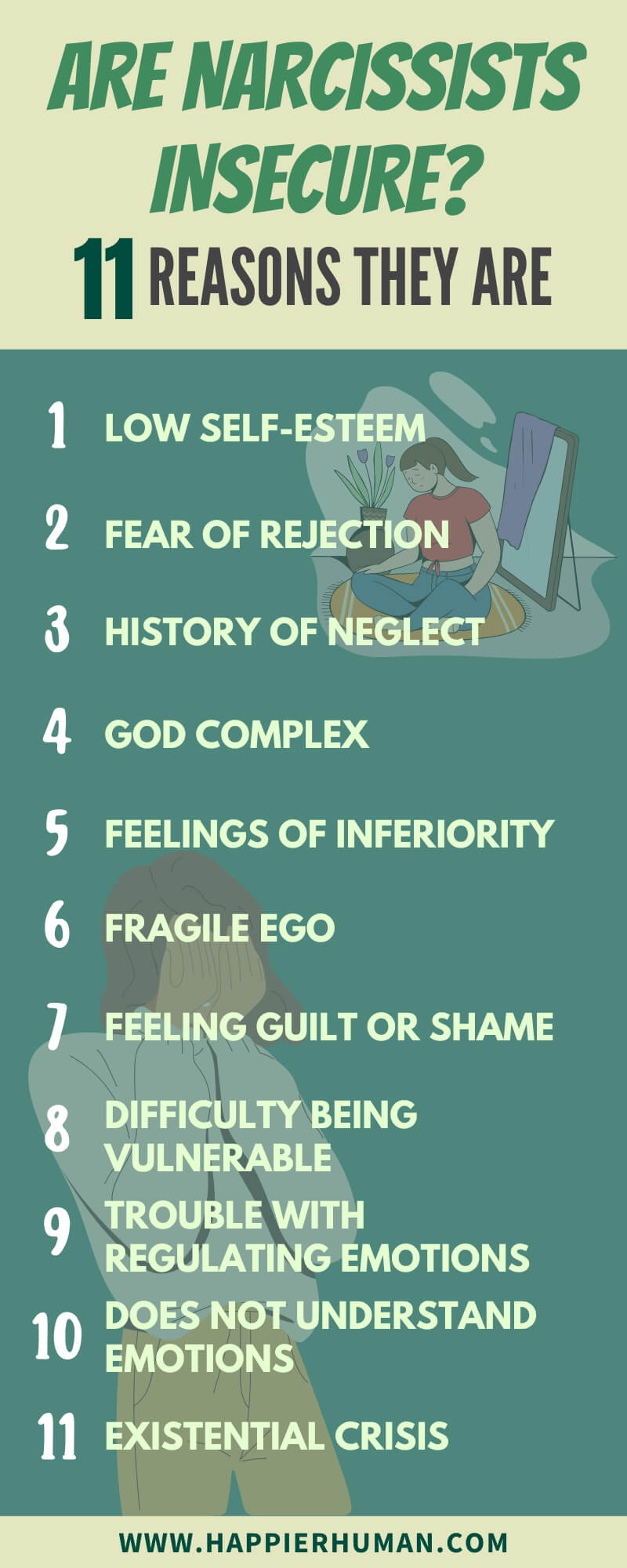If you're reading this, you might wonder why someone who seems super confident on the outside could be insecure on the inside. Well, that's a question many people have regarding narcissists.
I mean, are narcissists insecure? It’s hard to think of them as such since they often give off the impression that they're self-assured and don't need anyone else. But the truth is, many of them struggle silently with insecurities.
What is a Narcissist?
Narcissism is a personality disorder characterized by an exaggerated sense of self-importance, a need for admiration, and a lack of empathy for others. People with this disorder think they're way more unique and accomplished than they are. And because they feel so special, they expect others to give them attention or admiration.
Sadly, narcissism can start at a young age. It's often caused by parents or caregivers who either spoil their kids or don't set healthy boundaries. Children who aren't taught how to manage their emotions and behavior are more likely to develop narcissistic traits.
It can be tough to break free from these behaviors because they're profoundly ingrained and reinforced by the person's environment and social interactions.
Furthermore, certain types of people and personalities are more prone to narcissism. For example, super-ambitious and competitive people who crave attention and recognition are more likely to exhibit narcissistic behaviors.
Narcissism can also be more common in specific careers where they are given a lot of attention, like public speaking or performance. But it's important to remember that anyone can develop narcissistic traits – not just limited to a particular group or person.
11 Reasons Why Narcissists are Secretly Insecure
Despite how they might come across, narcissists are insecure. They are super sensitive to criticism and go to great lengths to protect their ego to maintain their sense of superiority. They may also rely on external validation and approval to feel good about themselves.

This insecurity can drive their need for attention and admiration, making them less empathetic and more likely to use others for their gain. It's important to remember that this insecurity is often at the root of narcissistic behaviors… and understanding this may help us communicate and interact with narcissists more effectively.
So let’s get started.
1. Low Self-Esteem
Even though narcissists seem super confident and self-assured, they tend to have pretty low self-esteem.
Their inflated sense of self-importance isn't usually backed up by their accomplishments or how others see them. They also feel inferior to others they see as successful or superior.
This insecurity can make them constantly crave attention and admiration to reaffirm their worth and value. It can also make them less empathetic and more likely to use others for their gain since they are afraid of rejection or vulnerability.
These factors can lead to low self-esteem and a sense of insecurity for narcissists.
2. Fear of Rejection
Narcissists fear rejection to protect themselves from feelings of inadequacy. To avoid rejection, narcissists try to control their relationships or manipulate others to get their way. They also pursue constant validation and attention from others to bolster their self-esteem.
However, these behaviors often only mask the deeper insecurities that narcissists try to hide. Narcissists' fear of rejection is often a reflection of their insecurity and inability to connect with others emotionally truly.
To overcome this fear, narcissists need to work on building a healthier, more realistic sense of self-esteem and learn to accept and understand their own emotions and the emotions of others. This can be a challenging process, but with time, effort, and support, it is possible to progress and develop more meaningful and fulfilling relationships.
3. History of Neglect
Although narcissism can develop from parents spoiling their children, narcissistic traits also appear in neglected children. When people don't receive the love, attention, and support they need as children, it can have a lasting impact on their pride and ability to form healthy relationships.
Narcissists who have experienced neglect seek constant attention from others to compensate for these feelings.
It's important to note that not all narcissists have a history of neglect, but the ones who do can become even more possessive and overbearing with their loved ones.
They crave your love, friendship, and admiration to heal their inner child. Although it is not the best way to heal from neglect, it can be a reason for their insecurities.
4. God Complex
A narcissist's God complex is their exaggerated sense of superiority – they think they're way better than others and deserve special treatment or recognition. This sense of worth can be fueled by underlying insecurity, a lack of confidence in their abilities, or inadequacy.
Narcissists rely on external validation and approval to feel good about themselves and be threatened by criticism or perceived challenges to their authority. All of these factors can contribute to their God complex, even though it may seem like they have a high opinion of themselves.
It's important to remember that despite their appearance of confidence, underlying insecurity drives their need for admiration and special treatment.
5. Feelings of Inferiority
On the surface, many narcissists appear confident and self-assured, but underneath, they often struggle with deep-seated feelings of inferiority and might actually believe that they are not as worthy or deserving as others.
One possible reason for this feeling of inferiority is unhealthy relationships with people in their lives. For example, they may have received overly critical or invalidating messages during childhood. Or they are in a relationship that does not meet their emotional needs.

This can lead to a belief that they are not good enough or do not deserve love and acceptance.
Another reason a narcissist may feel inferior is that they may have unrealistic or grandiose expectations for themselves. They may set impossibly high standards for themselves and feel like a failure when they cannot meet them. This can lead to a lack of self-esteem and deep-seated insecurity.
6. Fragile Ego
It's important to note that narcissists often have an extreme need for validation and admiration from others. They may go to great lengths to be seen as special or unique and have an overstated sense of their importance.
However, their self-worth is often closely tied to the admiration they receive from others. Their ego can be easily bruised if they don't get the recognition they deserve.
So a narcissist's fragile ego can be a significant source of their insecurity. They rely on external validation to feel good about themselves, and when they don't get it, it can be difficult for them to maintain a sense of self-worth.
A narcissist cannot go through life without polishing their ego. And the only way to do that is through other people’s validation.
7. Feeling Guilt or Shame
Narcissists often strongly desire to be seen as perfect or superior to others. They want to uphold a confident image and have difficulty admitting when they're wrong. However, despite their efforts to appear flawless, they're still human and can make mistakes or do things they later regret. When this happens, they may feel guilty or ashamed.
These emotions can be complicated for narcissists, as they often have fragile egos. They may feel their worth is wholly tied to their ability to be perfect or superior to others.

When they feel like they've failed in this regard, it can be difficult for them to maintain their confidence.
Overall, a narcissist's guilt or shame can contribute to their insecurity. They may struggle to cope with these emotions and may have difficulty accepting that they're not perfect. This can leave them feeling vulnerable and uncertain about their worth as a person.
8. Difficulty Being Vulnerable
Narcissists may find it hard to be vulnerable due to their insecurity for several reasons. One reason is that they often desire to appear competent to others. This need to appear strong and capable can make it difficult for them to be vulnerable and open, as they may fear being seen as weak or imperfect.
It can be challenging to be emotionally vulnerable around someone. But, once we open up to others, we grow meaningful connections.
Another factor that can contribute to a narcissist's difficulty with vulnerability is their tendency to manipulate and exploit others. They may be skilled at using others to get what they want, but this can make it difficult for them to form authentic, meaningful connections.
Narcissists would rather manipulate and appear confident instead of establishing genuine loving relationships.
9. Trouble with Regulating Emotions
Emotional regulation is the process of managing and healthily expressing emotions. It's about being able to identify and understand your feelings, as well as being able to cope with and communicate them effectively.
Narcissists struggle with emotional regulation because they have difficulty recognizing and acknowledging their emotions. They also have a hard time seeking healthy ways to cope with their feelings and turn to unhealthy or destructive behaviors instead. They lash out against loved ones, end relationships, or emotionally harm themselves.
This difficulty with emotional regulation can contribute to a narcissist's insecurity. They feel out of control and unable to cope with their emotions, leaving them vulnerable and uncertain about their worth.
10. Does not Understand Emotions
Narcissists often wrestle with feelings of insecurity because they struggle with expressing empathy. It’s difficult for narcissists to understand feeling’s outside their own.
If their friend is sad, they can’t empathize because of their inability to understand others’ emotions. Narcissists lose many friendships because they are unable to comfort their friends.

If a narcissist lack empathy and basic emotion, they will lose many people in their life. If they lose close friends and family, they lose the attention they believe they deserve. One of the biggest insecurities of narcissists is their lack of emotional intelligence.
They must learn how to be happy when their loved ones are happy. And offer comfort when they are sad. Until then, their insecurities around their lack of empathy will continue.
11. Existential Crisis
Narcissists may experience feelings of insecurity due to a fundamental existential crisis. This can result from a lack of meaning or purpose in their lives. These crises can lead to a sense of emptiness and a lack of direction, contributing to feelings of inadequacy and insecurity.
Narcissists may try to compensate for these insecurities by seeking admiration from others or projecting an exaggerated sense of self-importance. However, these behaviors often serve as a mask for their deeper insecurities and do not address the fundamental issues.
To overcome their insecurity, narcissists may need to address their existential concerns and work on finding meaning and purpose in their lives. This can be challenging, but it is essential to building a healthier, more fulfilling sense of self.
By addressing their existential concerns and building a stronger sense of self, narcissists can overcome their insecurities and develop more meaningful and fulfilling relationships.
Final Thoughts On Reasons Narcissists are Insecure
Narcissists are insecure because they have a deep-seated need for validation and attention from others. They often try to overcompensate for this insecurity by seeking power and control over others… and constantly seeking confirmation of their own self-importance.
It may be helpful for narcissists to seek therapy or counseling to work through their emotional issues. Licensed professionals can help them learn coping strategies for managing their insecurities.
It is important to remember that everyone has vulnerabilities, and it is perfectly okay to need support and understanding from others. If any of these reasons hit home with you, you might benefit from our article How to Stop Being a Narcissist: The 9-Step Plan.
Finally, if you want to identify YOUR personality type, then take one of these 11 personality tests to better understand what makes you tick.


